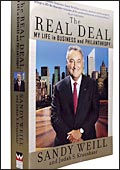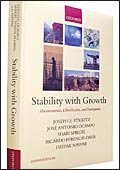 |
THE REAL DEAL
By Sandy Weill and Judah
S Kraushaar
Warner Business Books
Pp: 528
Price: Rs 680 |
With
$1.5 trillion in assets, Citigroup is double the size of Indian
economy. Yet, the man who built Citi-at least, as we now know
it-struck out on his own only in 1960 with some $30,000 in borrowed
capital. That's not how most entrepreneurial stories turn out.
But, then, Sandy Weill is no ordinary entrepreneur. For a man
who grew up as a shy kid and slow learner, Weill's act remains
unsurpassed in the global banking industry. The Real Deal is the
story of how Weill, inconceivably, came to lord over the biggest
bank in the world.
Written in collaboration with-no, not a BusinessWeek
or Fortune reporter, but-a former Merrill Lynch analyst, the book
is gripping simply because of its subject. While it clearly presents
Weill's life and events as the man himself saw them, the memoir
is frank and direct to a large extent. Weill makes no bones about
his differences with John Reed, the man behind Citicorp, with
which Weill merged his own Travelers Group to create Citigroup.
"Many may perceive that I had it in for John from day one
of the merger, but that notion is absolutely false. It was only
after seeing John's shockingly detached management style that
I lost confidence in our partnership," writes Weill.
Interestingly enough, two Indians feature
prominently in Weill's memoir. One is Ram Charan and the other
is Victor Menezes. The former, a management consultant (or "a
globe trotting corporate shrink of sorts" as Weill chooses
to describe him), is brought in to sort out differences between
Weill and Reed, and it's a task he performs well. It's at Charan's
behest that Reed accepts the "division of labour" as
suggested by Weill-an arrangement that moves Reed to e-Citi and
leaves Weill in charge of Citi's businesses and financial functions.
But it's the bit about Menezes that should surprise a lot of people
in this country. Not only was Menezes a protégé
of Reed, but he was also seen as a potential CEO at Citigroup.
That, however, was not to be. Menezes, says Weill, was responsible
for the $2 billion in losses that Citigroup bore following the
currency meltdown in Argentina in 2001 and 2002. "The events,"
writes Weill, "revealed important flaws in Citigroup's management
model. I gradually realised to my disappointment that Victor Menezes
stood at the center of our issues." As it turns out, Menezes
got the rap for downplaying the risks that Citi ran at the time
of Argentina's political and economic turmoil.
It's possible that the people who feature
in Weill's memoir don't see things quite the way he does, but
The Real Deal is as honest and self-critical as any man writing
about himself can be. In other words, it's one of those autobiographies
you don't want to miss reading.

|
STABILITY WITH GROWTH
By Joseph E Stiglitz et
al
Oxford University Press
Pp: 339
Price: Rs 695 |
The
hardest part of managing any economy is to ensure growth while
maintaining stability. The concerns range from how much foreign
capital to allow into a country's stock markets to how much fiscal
deficit a government should allow in pursuit of growth to the
perennial tussle between inflation and interest rates. For developing
countries, which must also balance the economic imperatives with
political compulsions, the challenge of doing so is harder still.
What compounds the problem for developing countries is the so-called
'Washington consensus'-the policies that the World Bank and the
International Monetary Fund tend to impose on them. According
to the Washington consensus, low inflation, fiscal discipline,
privatisation and liberalisation need to be the mantras of developing
countries.
Of course, not all economists or policy makers
even in developed countries agree with the Washington consensus.
Stability with Growth, which represents the dissenters, argues
that "stabilization policy has important consequences for
long-term growth and has often been implemented with adverse consequences".
Making the case is a bunch of heavy-weight economists including
Joseph Stiglitz and Deepak Nayyar. Their basic proposition is
that developed and developing countries have different macroeconomic
objectives and structures. Therefore, the focus should be on real
stability and not merely price stability. It's an argument that
will find many takers in developing countries.
|






